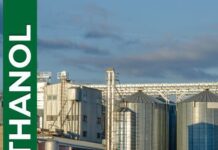Ever on the lookout for new ways to improve the fermentation of corn sugars into ethanol fuel, USDA’s Agricultural Research Service (ARS) scientists have developed a method that employs genetically modified baker’s yeast to address a major cause of ethanol plant shutdowns: contamination by unwanted bacteria.
As per USDA’s ARS, scientists modified the yeast’s genetic makeup with “coding” to make an enzyme on its outer surface that kills or inhibits the growth of the bacteria—microbial rivals whose release of acetic and lactic acids can keep the fermentation process from achieving its peak ethanol production capacity.
Shao-Yeh Lu, a research microbiologist with ARS’ National Center for Agricultural Utilization Research in Peoria, Illinois explained, “These bacteria are found everywhere in the environment, especially on plant material. They are actually responsible for the fermentation of vegetables to make products like sauerkraut and pickles. Unfortunately, the acetic acid and lactic acid produced by these same bacteria in a bioethanol fermentation facility will cause stress and inhibit the growth of the baker’s yeast (Saccharomyces cerevisiae), which is responsible for the production of ethanol.
As per report, bacteria that invade fermentation systems consume glucose sugars in the corn mash—the same sugars that yeast converts into ethanol. This bacterial interference can reduce ethanol conversion by approximately 16 to 42 percent. In biorefinery plants, this often leads to shutdowns for cleaning and the use of antibiotics, resulting in about $4.5 million in annual lost revenues for a facility with a 100-million-gallon-per-year capacity.
“Current methods for eliminating bacterial contaminants in bioethanol production heavily rely on antibiotics,” Lu noted. “However, this approach is unsustainable long-term, as prolonged antibiotic use can lead to antibiotic-resistant bacteria.”
To address this issue, Lu and his team decided to level the microbial playing field by modifying a baker’s yeast strain with a gene that produces endolysin, an enzyme that destroys bacteria on contact.
According to the USDA’s ARS, in lab-scale trials, the use of yeasts engineered to produce endolysin reduced bacterial presence by 85 percent compared to a control group of unmodified yeasts. This reduction led to an average decrease in acetic and lactic acid levels in the mash by up to 40 percent and 71 percent, respectively, and boosted ethanol production by as much as 40 percent.

















